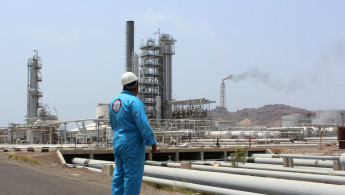Yemen seeks oil investors despite internal chaos
Speaking during a visit to a facility in Handramout run by PetroMasila – a state-owned oil exploration and production company – Minister of Oil and Minerals Seif Sharif said that international oil companies had been encouraged by the Saudi-backed government’s success in bringing security and stability to the country’s oil provinces, particularly Hadramout, Marib, and Shabwa.
Sharif additionally said that scientific studies carried out in these regions had previously shown the existence of potentially large reserves of oil, gas and valuable minerals.
“We are keen for the government to ensure an adequate and conducive environment for the exploitation of these (resources) for the benefit of citizens,” said Sharif.
Crude oil shipments from Yemen resumed on a small scale in August last year after coming to a standstill in early 2015 following the proliferation of conflict in the country pitting the Saudi-backed government of Abdrabbuah Mansur Hadi against the Houthi forces who pledge allegiance to former President Ali Abdullah Saleh.
Since the start of 2016 PetroMasila has been operated entirely by indigenous staff after the exit of Canadian company Nexen, which had been its operator.
 |
| Click to enlarge |
Notably in November Sharif was reported to have met with the general manager OMV to speak about the possibility the Austrian oil company would resume its operations in Shabwa province.
However, Sharif’s optimism on Wednesday, stood in contrast to certain realities in Yemen which is in itself in the midst of a fuel crisis.
While Sharif has held talks in recent months with Kuwaiti officials concerning the import of Kuwaiti oil to the government-controlled refinery in the port city of Aden which was reactivated in September 2016, in other areas of the country – particularly those under Houthi control – oil infrastructures have been damaged by fighting on the ground and airstrikes carried out by a Saudi-led coalition of Arab states aligned with the Mansour government.
Exacerbating this problem ships carrying oil, in addition to other products including humanitarian aid, have been unable to reach Houthi-controlled ports due to the imposition of a blockade by the Saudi-led coalition.
According to aid agencies and rights groups the fuel crisis has exacerbated humanitarian suffering in the country.
Yemen is a small oil producing state, is not a member of OPEC, and traditionally relies on establishing production-sharing agreements with foreign oil companies in order to exploit and consequently export its natural reserves.
In 2008 income from oil production constituted around 75 percent of the Yemeni government’s revenue and around 90 percent of exports. However, with existing wells running dry in 2012 the World Bank predicted that if no new oil fields are found crude oil reserves would be exhausted in the next 10 to 12 years.





 Follow the Middle East's top stories in English at The New Arab on Google News
Follow the Middle East's top stories in English at The New Arab on Google News
![Netanyahu furiously denounced the ICC [Getty]](/sites/default/files/styles/image_330x185/public/2024-11/GettyImages-2169352575.jpg?h=199d8c1f&itok=-vRiruf5)
![Both Hamas and the Palestinian Authority welcomed the ICC arrest warrants [Getty]](/sites/default/files/styles/image_330x185/public/2024-11/GettyImages-2178351173.jpg?h=199d8c1f&itok=TV858iVg)
